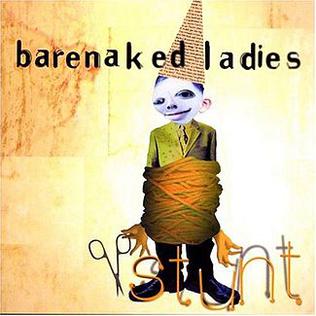
Stunt is the fourth full-length studio album by Canadian alternative rock band Barenaked Ladies. Their most successful album, it entered the US charts at No. 3 and sold over 4 million units by the end of its chart run. Its first single, "One Week" became the band's breakthrough single in the US market by hitting No. 1. The song also reached No. 5 in the UK, and helped revitalize their career in the band's home country of Canada, where their fame had diminished since the days of their debut album Gordon. In addition, follow-up singles "It's All Been Done", "Alcohol" and "Call and Answer" were each successful to some degree.

Maroon is the fifth full-length studio album by Barenaked Ladies. The album was the follow-up to 1998's Stunt, the band's most successful album in the United States. Maroon debuted at No. 1 in Canada and No. 5 on the U.S. Billboard 200. In its first week, the album sold 17,800 copies in Canada and just under 128,000 in the US. It has sold at least 1 million copies in the US alone. The album spawned three hit singles: "Pinch Me", "Too Little Too Late" and "Falling for the First Time".

Purple Onion is the debut studio album by The Les Claypool Frog Brigade, released on September 24, 2002. It followed two live releases by the band, and is the first release of the Frog Brigade's original compositions. While the Brigade regulars are consistent on much of the record such as Jay Lane, Eenor Wildeboar, Skerik and new percussionist Mike "Tree Frog" Dillon, many special guests appear on the album as well. Guests on multiple tracks include Ben Barnes and Sam Bass. "D's Diner," a tribute to a Sebastopol, California restaurant, features sitar player Gabby La La in addition to the triple-bass onslaught of Claypool, Norwood Fisher (Fishbone) and Lonnie Marshall. Warren Haynes adds slide guitar on the "Buzzards of Green Hill" and Fish Fisher guests on "Whamola." "Whamola" was a live show staple named after the unique instrument Les employs—a one-string bass played with a drumstick. The song later appeared as a remix for the theme of South Park Season 10. "Barrington Hall" is a tribute to the UC Berkeley student housing known in the 1960s-1980s for counterculture. Purple Onion was released on vinyl for the first time on November 24, 2009.

Elton John is the second studio album by English singer-songwriter Elton John. It was released on 10 April 1970 through DJM Records. Including John's breakthrough single "Your Song", the album helped establish his career during the rise of the singer-songwriter era of popular music.

Sail Away is the third studio album by Randy Newman, released on May 23, 1972. It was produced by Lenny Waronker and Russ Titelman and issued on Reprise Records. While all of its songs were written and composed by Newman, several had already been recorded by other artists.

Dis Is da Drum is Herbie Hancock's thirty-fourth album and his first solo album since leaving Columbia Records. Guests include saxophonist Bennie Maupin, trumpeter Wallace Roney and flautist Hubert Laws.

Dirty Work is the eighteenth studio album by the English rock band the Rolling Stones. It was released on 24 March 1986 on the Rolling Stones label by CBS Records, their first under their new contract with Columbia Records. Produced by Steve Lillywhite, the album was recorded during a period when relations between Mick Jagger and Keith Richards had soured considerably, according to Richards' autobiography Life.
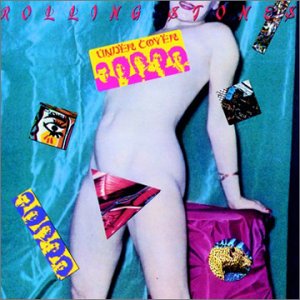
Undercover is the seventeenth studio album by English rock band the Rolling Stones, released on 7 November 1983 by Rolling Stones Records. The band would move the label to Columbia Records for its follow-up, 1986's Dirty Work.
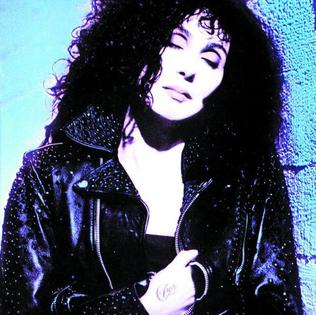
Cher is the eighteenth studio album by American singer-actress Cher, released on November 10, 1987 by Geffen Records. The album has been certified Platinum in the US by the RIAA and Gold in Australia by ARIA and the UK by BPI.

Crowded House is the debut album by New Zealand-Australian band Crowded House. Produced by Mitchell Froom, it was released in August 1986 and was certified platinum in four countries. The album includes the hit singles "Don't Dream It's Over", "Something So Strong", "Mean to Me", "World Where You Live" and "Now We're Getting Somewhere".

Ocean Songs is the fourth major album by Australian rock band Dirty Three, released in March 1998 by Touch and Go Records. It was recorded at Electrical Audio in Chicago during August and September 1997. Its cover was designed by guitarist Mick Turner. David Grubbs plays piano and harmonium on some tracks.

Lou Reed Live is a live album by Lou Reed, released in 1975. It was recorded at the same concert as Rock 'n' Roll Animal ; on December 21, 1973, at Howard Stein's Academy of Music in New York. It features three songs from Transformer, one song from The Velvet Underground & Nico and two songs from Berlin. Between this album and the remastered Rock 'n' Roll Animal, the entire show has been released, albeit in a different order than the original concert setlist.

Absolutely Live is a live album by musician Rod Stewart. It was released as a double–LP in 1982. The subsequent CD version omitted the tracks "The Great Pretender" and "Guess I'll Always Love You" in order to fit the album onto a single disc. The liner notes state that there are no overdubs on this live album.
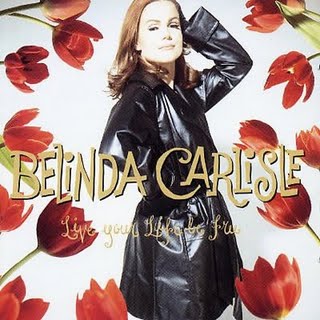
Live Your Life Be Free is the fourth studio album by American singer Belinda Carlisle, released in 1991 by MCA Records in the United States and Virgin Records in the UK. This was the first of Carlisle's albums not to chart on the Billboard charts The album was also the last of hers to produce a U.S. Billboard Hot 100 single. The album fared better in the UK, where it peaked at number seven.

Jim Ronald White is an Australian drummer, songwriter, and producer. In 1992 he formed Dirty Three, an instrumental rock band, with fellow mainstays Warren Ellis on violin; and Mick Turner on guitar. In Dirty Three, White sometimes shares songwriting duties with Ellis and Turner.

An Evening with the Allman Brothers Band: First Set is the thirteenth album by the rock group the Allman Brothers Band. It was recorded live in December 1991 and March 1992, and released in 1992.
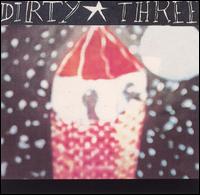
Dirty Three is the self-titled second major recording by Australian trio, the Dirty Three. The album was recorded between 1993 and 1994 at Studio 325, Melbourne, Australia. ‘Kim’s Dirt’ is a longer version to the trio's other recording of the track, which is on their previous release Sad & Dangerous.

What's the Word is the second studio album by the Austin, Texas-based blues band the Fabulous Thunderbirds, released in 1980. Like its predecessor, the album initially sold poorly, but is now regarded as a noteworthy blues recording of the period. The 2000 CD reissue on Benchmark Records contains three bonus tracks, two of which were recorded live at Club Koda, Austin, Texas.

Ghostyhead is the seventh studio album by the artist Rickie Lee Jones. It was released in 1997 on Warner Bros. Records.

Dirty Three are an Australian instrumental rock band, consisting of Warren Ellis, Mick Turner and Jim White (drums), which formed in 1992. Their 1996 album Horse Stories was voted by Rolling Stone as one of the top three albums of the year. Two of their albums have peaked into the top 50 on the ARIA Albums Chart, Ocean Songs (1998) and Toward the Low Sun (2012). During their career they have spent much of their time overseas when not performing together. Turner is based in Melbourne, White lives in New York, and Ellis in Paris. Australian rock music historian Ian McFarlane described them as providing a "rumbling, dynamic sound incorporated open-ended, improvisational, electric rock ... minus the jazz-rock histrionics". In October 2010, Ocean Songs was listed in the book 100 Best Australian Albums.



















